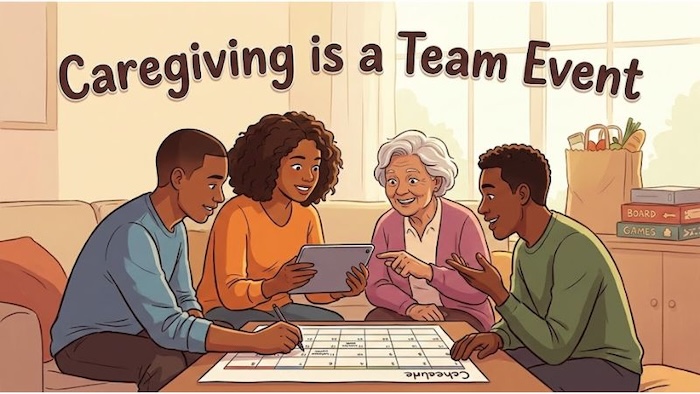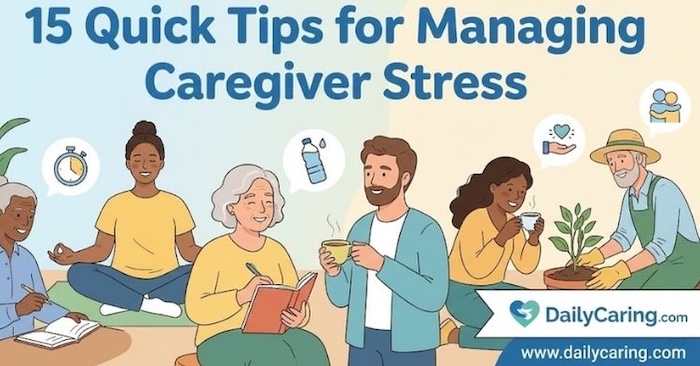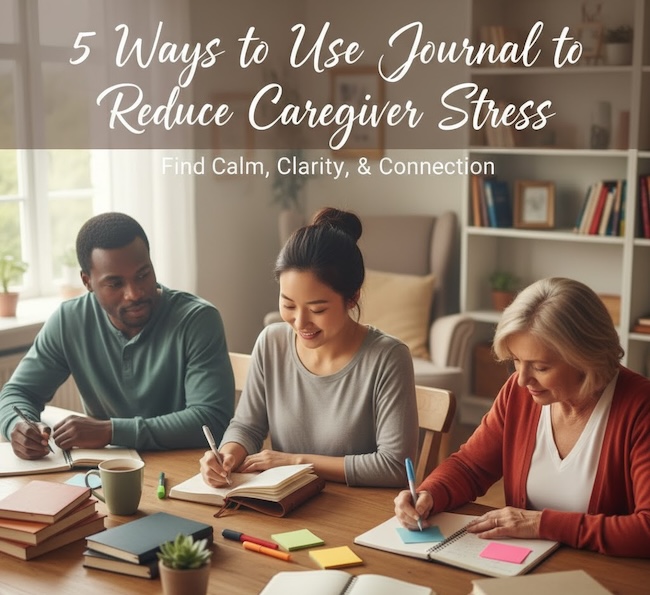That feeling of being completely drained, emotionally numb, or even secretly resentful toward the person you're caring for is more than just burnout—it's a specific and profound condition known as compassion fatigue.

It's the cost of caring deeply in the face of prolonged stress, and if you're experiencing it, it doesn't mean you're a bad caregiver; it means you're a human being running on empty. The good news is that this exhaustion is not a permanent state. By recognizing the signs and taking proactive steps, you can replenish your spirit and rediscover the meaning in your compassionate role.
These eight essential tips are your guide to coping, healing, and protecting your own well-being on this demanding journey.
Compassion Fatigue Can Hurt Caregivers
Caregiving is an all-consuming responsibility, whether you’re doing hands-on personal care or managing care from a distance.
That can put you at risk for compassion fatigue.
Compassion fatigue can be a side effect of caring for someone in need. It causes physical and emotional exhaustion, reducing the ability to empathize.
It’s common among doctors, nurses, and other health professionals and is called secondary traumatic stress. You basically get stressed from continually helping or wanting to help others who are suffering.
If it’s not managed, compassion fatigue significantly worsens your health and well-being.
It also reduces your ability to care for your older adult. You can’t be engaged, warm, and caring because you don’t have it in you anymore.
To protect yourself, it’s essential to learn good self-care strategies and coping techniques.
We explain how it differs from caregiver burnout, share the symptoms to watch for, and provide 8 tips for coping with compassion fatigue.
Compassion Fatigue vs Burnout
Compassion fatigue and burnout share similar symptoms, but there are key differences between them.
Burnout usually develops over time. Top signs of burnout include emotional and physical exhaustion, feelings of negativity and indifference, and a sense of not being able to complete tasks effectively.
Compassion fatigue happens when you become traumatized by your older adult’s suffering. It can come on more quickly than burnout.
You may still feel empathy and the desire to help, but you might feel overwhelmed by the symptoms. It can also lead to burnout.
Common Signs of Compassion Fatigue
Compassion fatigue is essentially a chronic, low-level cloud that hovers over the care and concern you have for your older adult.
When you overuse your compassion without regularly taking time to recharge, the ability to feel and care for others wears down.
Common symptoms of compassion fatigue include:
- Physical or emotional exhaustion (or both)
- Reduced feelings of sympathy or empathy
- Dreading taking care of someone and feeling guilty about it
- Feeling irritable, angry, or anxious
- Headaches
- Trouble sleeping
- Isolating yourself
- Feeling disconnected
- Reduced sense of accomplishment or meaning in caregiving
- Trouble making decisions
- Problems in personal relationships
VIDEO: Dealing with Compassion Fatigue – 8 Essential Tips
How to Cope with Compassion Fatigue: 8 Ways to Improve Caregiver Health
1. Be aware of changes in your level of compassion fatigue
Your level of stress and how you feel about caregiving can change from day to day and may also depend on your older adult’s health.
By regularly noting how you’re feeling, you can track your stress and compassion fatigue levels over time.
You could try rating your feelings on a scale of 1 to 10.
For example, if you’re usually feeling irritated and overwhelmed as well as having trouble sleeping due to worry, you might decide that you’re at a seven and jot down a few top symptoms.
The scale is up to you – a one could mean no symptoms at all, a five could be a variety of symptoms that come and go, and a 10 could be that your symptoms are so severe and unrelenting that your health is at serious risk.
Keeping an eye on your compassion fatigue levels and identifying the top symptoms helps you notice and take action before you reach a severe stage, such as a 9 or 10.
2. Make self-care a priority
Taking care of yourself isn’t a luxury; it's a necessity. Self-care is essential for long-term caregiving. It keeps you mentally and physically healthy, protecting against compassion fatigue.
It might feel selfish to take time for yourself, but if you’re run-down, overwhelmed, and have a short temper, that will definitely come through when you’re caring for your older adult.
When you’re feeling healthy, you’re able to be a better caregiver.
Each person has a different way of taking care of themselves, but in general, you’d probably want to:
- Exercise regularly
- Eat a healthy diet
- Have a good sleep routine and get as high-quality sleep as possible
- Take time for yourself each day – even if it’s only 10 minutes
- Get help with caregiving or household tasks
- Find ways to take breaks from caregiving – like using respite care
3. Spend time with friends
An essential part of maintaining balance while caregiving is to keep up your social connections. This helps prevent loneliness, isolation, and depression.
Spending time with friends — chatting, sharing a meal, or taking a walk together — is an excellent way to de-stress and take your mind off caregiving worries.
4. Join caregiver support groups
Caregiver support groups are filled with people in similar situations – they’ll truly understand what you’re going through.
Participating in online or in-person caregiver support groups can significantly improve your quality of life because you’ll feel less alone and be able to get advice on handling difficult situations, vent frustrations, learn new coping skills, and more.
5. Write in a journal
An effective stress-reduction technique perfect for caregivers is journaling.
Expressing your thoughts and feelings on paper, rather than keeping them in your head, is highly therapeutic.
Journaling helps you process thoughts and emotions and can even help you find solutions to challenges or make tough decisions.
Plus, writing in a journal is free, takes as much or as little time as you’ve got, and can be done anywhere.
6. Use positive ways to cope with stress
After a tough day, it’s tempting to plop down in front of the TV with a bag of chips or cookies and a bottle of wine, but those aren’t positive coping techniques.
Instead, put together a list of go-to coping strategies that are positive and healthy.
The idea is to do things that will make you feel better in the short term and ultimately improve your health and well-being.
Suggestions for healthy coping strategies:
- Take a walk
- Meditate
- Do a 4 minute workout
- Practice some deep breathing
- Call, text, or visit with a friend
- Watch some funny video clips on YouTube
- Take a hot bath or shower
- Get additional suggestions on how to de-stress
7. Spend time on hobbies
Before you became a caregiver, you had hobbies and activities that you enjoyed.
Regularly taking time for those activities is a great way to take a break from caring for your older adult.
This improves quality of life and reduces the risk of compassion fatigue because it’s something fun and creative that you do just for yourself – and isn’t related to caregiving, work, or chores.
8. Speak with a counselor or therapist
If your compassion fatigue levels are increasing, talking with a counselor or therapist can bring relief.
They help people deal with negative thinking, stress, depression, anxiety, significant life changes, and more.
A therapist can guide you toward practical ways to reduce compassion fatigue and manage the challenging emotions that often accompany caregiving.
Final Thoughts
Overcoming compassion fatigue is not a sign of weakness, but a necessary act of preserving your ability to care. By practicing these strategies, you are not abandoning your loved one; you are replenishing the well of empathy that makes your care so profound.
This is a journey of sustainable compassion, not a sprint. Be patient and kind with yourself as you learn to balance profound empathy with essential self-preservation. You are doing incredibly demanding work, and you deserve to find a way to continue that is both compassionate to your loved one and sustainable for you.
Recommended for you:
- Caregiver Emotions: 2 Tips for Managing Tough Feelings
- 5 Expert Tips for Reducing Caregiver Guilt
- 11 Ways to Cope with Feeling Unappreciated as a Caregiver
About the Author

Connie is the founder of DailyCaring.com and was a hands-on caregiver for her grandmother for 20 years. (Grandma made it to 101 years old!) She knows how challenging, overwhelming, and all-consuming caring for an older adult can be. She also understands the importance of support, especially in the form of practical solutions, valuable resources, and self-care tips.














Wow, thank you for this article. I am going to college to become an LCSW-C, and I just started my internship. This article was so very helpful. I am a very proactive type of person. So, if I can recognize this within myself before it ever really gets started, then I can be a much better therapist.
God bless,
W.
So glad this article is helpful! Best of luck in your internship, it’s wonderful that you’ll be helping others through therapy.
Thank you for all the tips, I’m new at this. I just started caring for my mother this year, she was with my sibling the year before. Since my father passed away 2 year’s ago I knew it would be me caring for her, and I tried to prepare for it. I’m a planner and a worrier so I thought I had a plan. But I did not plan for how exahusted I would be, a kind of tired that does not go away after a good nap. Reading the tips here and all the information lets me plan and feel better about my ability to do my best.
We’re so glad our articles have been helpful and are sorry for the loss of your father. Caring for someone is a challenging job, but it’s great that you thought ahead and made a plan. Regardless, taking on the role and all the responsibilities is definitely tiring and that’s why it’s so important to seek out and accept help and support ❤️
How can I help my husband. If I talk to him about this he is going to think I’m blaming him for our distance. I’m realizing that my husband has been taking care of me for years prior to my cancer diagnosis. Now that I’m on the road to recovery I want to help him and us heal, before we divorce. I adore him.
It’s great that you’re recovering and wonderful that you understand that things have been tough on your husband too. It’s a sensitive discussion, so it’s good to think through what you’d like to communicate.
It may help to speak with a counselor or therapist, either on your own or together as a couple. If you belong to a faith organization, it may also help to speak with someone who can offer counseling or advice.
In case it’s helpful, here’s some info on where to find low-cost counseling — 3 Sources of Affordable Counseling Services to Reduce Caregiver Stress https://dailycaring.com/low-cost-therapy-options-help-caregivers-cope/
Thank you for all the tips daily. This has been on my mind for sometime now. I have been care giving for the last 5 years and in the last year it’s 7 days a week. I’m so tired mentally and physically. I decided to take the weekends off for the next few weeks. I will be going to get a body massage each week. Changed my diet and will start my exercising 20 minutes a day. And most important journal. Again the daily tips has helped me to learn about the disease and myself in this journey. I do love what I do and want to always be at my best. Again thank you!
I’m so glad our articles have been helpful! You’ve been doing this for a long time and 7 days a week is a grueling schedule for any type of work! It’s wonderful that you’ve recognized the signs that you need more self-care in order to be able to care for others. The changes that you’re making are fantastic! They’re all so positive and effective for your long-term physical and mental health. I’m sure they will help you feel good about caregiving and do an even more wonderful job ❤❤